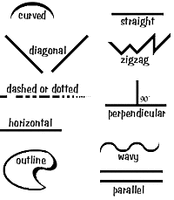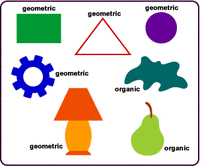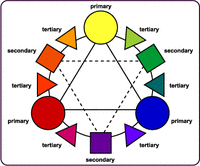Understanding Formal Analysis " Elements of Art"
7 Elements of Art
Elements of is the building blocks used by artists to create a work of art.
Line

Line is a mark with greater length than width. Lines can be horizontal, vertical, or diagonal; straight or curved; thick or thin.
Shape

The shape is the closed line. The shape can be geometric, like squares and circles or
organic like free-form or natural forms. Shapes are flat and can express length
and width.
Forms
http://www.greececsd.org/webpages/akirkebye/imageGallery/forms.bmp
Forms are three dimensional shapes expressing length, width, and depth. Balls,
cylinders, boxes, and pyramids are forms.
Space

Space may be the particular area between and around things. The space around items is generally
Called area that is negative, negative space has form. Area can also refer to the
The sense of depth. Real space is three-dimensional; in artistic art, once we create
The impression or feeling of depth, we call it room.
colour

The colour is light reflected off of items. Color has three faculties which can be primary hue
(the title associated with colour, such as red, green, blue, etc.), value (just how light or dark itIs), and intensity (how dull or bright it is).
• White is a light that is pure black is the absence of light.
• Main colours would be the only true colours (red, blue, and yellowish). All other
colours are mixes of primary colours.
• additional colours are a couple of primary colours mixed (green, orange, violet).
• Intermediate colours, often called colours which are tertiary are made by combining
A primary and colour that is additional. Some situations of intermediate
colours are yellowish green, blue-green, and violet that is blue.
• Complementary colours are located straight across from each other on the
colour wheel (an arrangement of colours along a diagram that is a circular show
How they are associated with the other person). Complementary pairs contrast
Simply because they share no colours which can be common. For instance, green and red are
Complements, because green is made of yellowish and blue. When complementary
colours are mixed, they neutralize each other to help make
brown.
Texture
http://www.greececsd.org/webpages/akirkebye/imageGallery/untitled.bmp
The texture may be the area quality that can be thought and seen. Textures can be, or that is rough
Smooth, hard or soft. Textures never always have the genuine way they appear; for example,
A drawing of a porcupine might look prickly, however, if you touch the drawing, the
paper continues to be smooth.

please , would you stop plagiate?
Just STOP this
hello
i just voted you
follow me
lets help each other :)